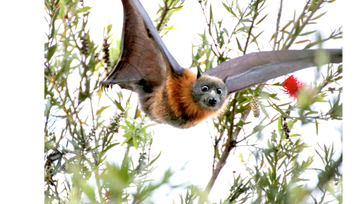Bat Trade Working Group |
our visionWe envision a world in which bats are protected from illegal and/or unsustainable exploitation and trade.
our missionWe aim to inform and support evidence-based interventions to end the illegal and/or unsustainable domestic and international trades in live bats and bat specimens. As such, we conduct interdisciplinary research, catalyse legislative change and advise and assist with on-the-ground conservation efforts.
|
our leadership |
Dr Joanna L. Coleman, Co-Chair
Dr Chris R. Shepherd, Co-Chair |
our members |
Dr Joe Chun-Chia Huang
Dr Tigga Kingston Dr Benjamin PY-H Lee Dr Joy O’Keefe Dr Nistara Randhawa Ms Abby Rutrough Dr Vu Din Thong Dr Susan Tsang |
current projects |
Our flagship issue is ornamental trade, and our flagship species is the painted woolly bat, Kerivoula picta. Using data science, we documented e-commerce in K. picta. From October through December 2022, we quantified ornamental-bats offered for sale to consumers in the United States on Amazon, eBay and Etsy. Our study, funded by the Animal Welfare Institute and in collaboration with Monitor Conservation Research Society, paints a very concerning pattern of trade that suggests high demand and a likely unsustainable harvest of this bat. Our work has been featured in a National Geographic article, and our paper is in the European Journal of Wildlife Research.
Thanks to a generous, IUCN SSC grant, in June 2024, we commenced a follow-up study of the K. picta trade in Vietnam. Using direct observation, social science and data mining, we aim to understand the supply chain (i.e., network of human actors, the number of individuals that are harvested and how and where bats are collected). The results of both studies are intended to provide evidence that would justify a proposed amendment to the Convention on the International Trade in Endangered Species of Wild Flora and Fauna (CITES) at the 2025 Conference of Parties (COP20). We will work with a proponent nation (e.g., Vietnam) on this proposal and perform lobbying activities to enhance support among other CITES parties. Our work has also led to a petition to add K. picta to the US Endangered Species Act, a move that would make imports of this species illegal. The petition is here, and the Lubee Bat Conservancy provides a great description of the issue with instructions on how anyone can support this petition (by writing to the US Fish & Wildlife Service) on this webpage. And individuals who with to report observations of any bats being traded as ornaments (e.g., in tourist shops) are encouraged to do so via the Bat Hunting portal of the Global Union of Bat Diversity Networks (GBatNet). |

